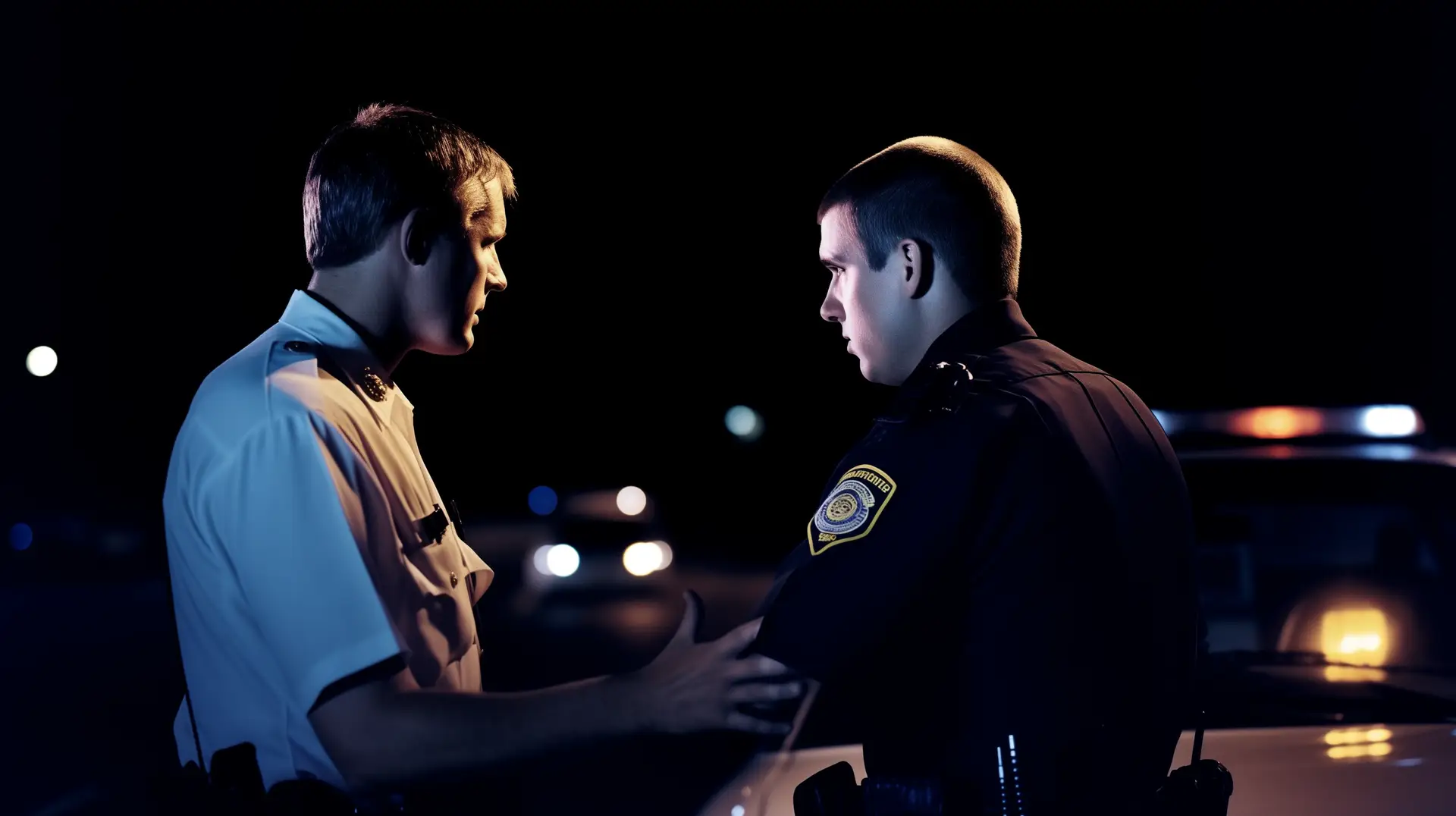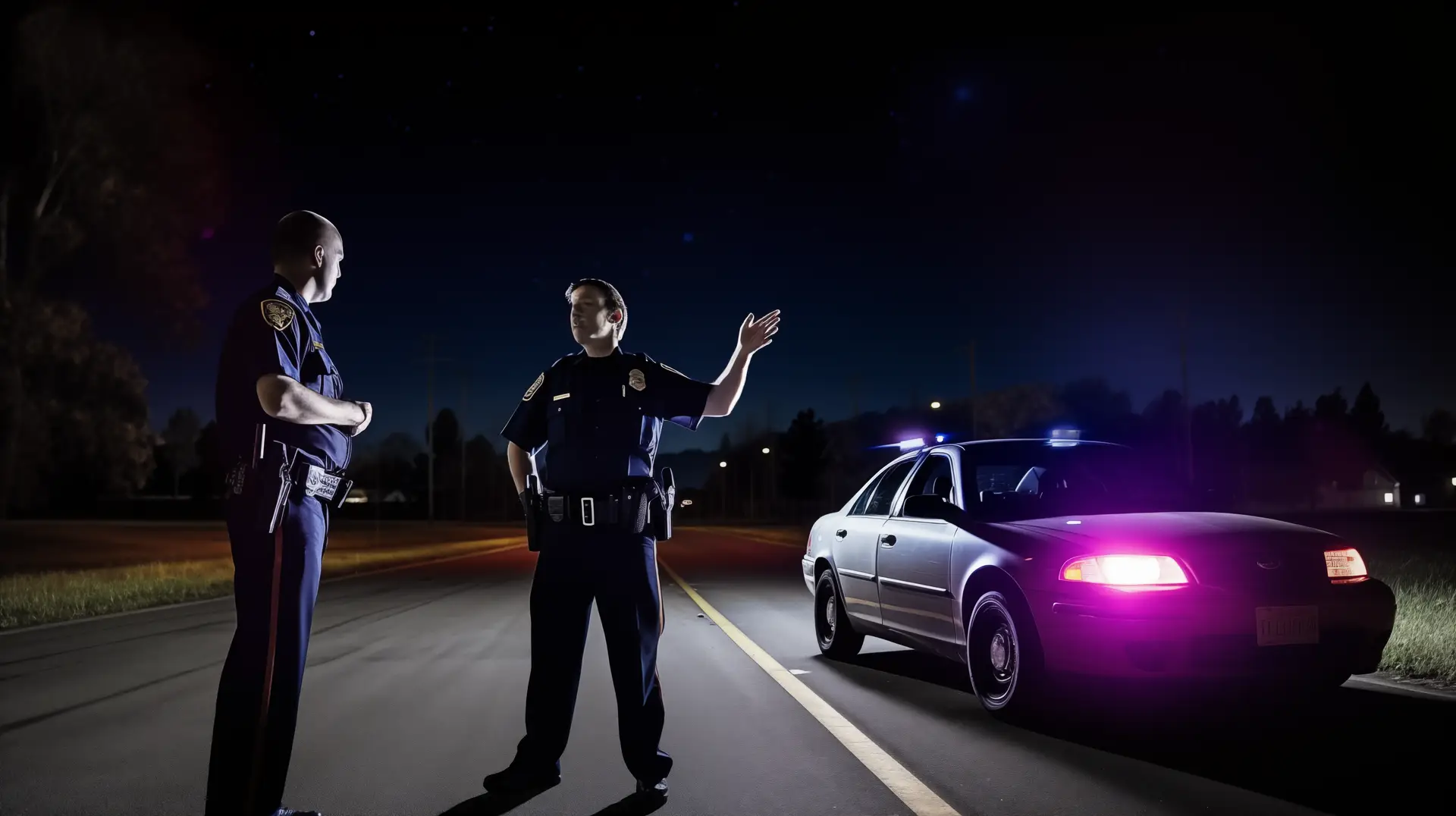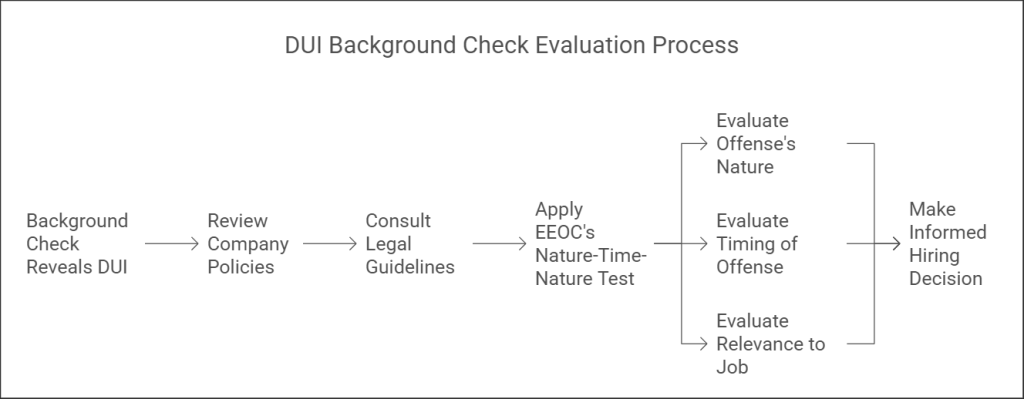DUIs, both misdemeanors and felonies, can significantly impact employment opportunities. Employers typically conduct thorough background checks, including driving records, to ensure candidates meet job requirements. It's essential to differentiate between DUI and DWI (driving while intoxicated) as both can appear on background checks but may have different legal implications.States may have varying regulations on how long these offenses stay on your record and how they are reported.
Key Takeaways
- DUI Visibility on Background Checks: A DUI typically shows up on criminal background checks, but its classification varies by state. In some states, it's considered a traffic offense and may appear only on motor vehicle records. For instance, New York treats DUIs as traffic infractions, while Texas classifies them as criminal offenses.
- Misdemeanor vs. Felony DUI: First-time DUI offenses are often misdemeanors, resulting in lighter penalties like fines or probation. However, repeat offenses or DUIs causing significant harm can escalate to felonies, leading to harsher consequences and greater impact on employment opportunities.
- Duration on Record: A DUI can remain on a criminal record indefinitely unless expunged. Expungement laws vary by state; some allow for misdemeanors to be cleared after a certain period, while felonies may not be eligible. Driving records, separate from criminal records, can retain DUIs for 5-10 years or longer, depending on the state.
- Impact on Employment: Employers often conduct comprehensive background checks, including driving records, especially for positions involving driving responsibilities. A DUI can influence hiring decisions, with felony DUIs posing a more significant concern. Employers should consider the nature of the offense, its relevance to the job, and the time elapsed since the incident.
- Legal Compliance for Employers: When a background check reveals a DUI, employers must adhere to legal guidelines, such as the Fair Credit Reporting Act (FCRA) and "Ban the Box" laws. This includes providing pre-adverse action notices, allowing candidates to respond, and sending final adverse action notices if necessary. Employers should also apply the Equal Employment Opportunity Commission's (EEOC) nature-time-nature test, evaluating the offense's nature, the time elapsed, and its relevance to the job role.
Does a DUI Show Up on a Background Check?
A DUI, or driving under the influence, usually appears on a criminal background check. This varies by state; some classify DUIs as traffic offenses revealed through motor vehicle records. For example, New Jersey, New York, and Wisconsin may list a DUI as a traffic offense. Regardless, understanding state-specific rules is crucial for accurate background checks.

State-Specific Differences in DUI Background Checks
Understanding state-specific differences is crucial for accurate DUI background checks. States vary in how they classify and report DUIs. For example:
- California: A DUI stays on your driving record for ten years and is a misdemeanor for first-time offenses.
- New York: Treats DUIs as traffic infractions, not crimes, but they still appear on driving records.
- Texas: DUIs are criminal offenses and remain on your record indefinitely unless expunged.
- Florida: A DUI is a misdemeanor but can escalate to a felony for repeat offenses or severe cases.
Employers must know these differences to ensure compliance and fair hiring practices.
Misdemeanor DUI vs Felony DUI
DUIs can be misdemeanors or felonies. A misdemeanor typically results in lighter penalties, like fines or probation, while felonies incur severe consequences. First-time DUIs often result in misdemeanors but repeat offenses or DUIs causing serious harm may be felonies. Employers must consider the nature of the DUI when making hiring decisions.
Employment Impact of Misdemeanor DUI
A misdemeanor DUI might not automatically disqualify a candidate. It depends on the company's policy and relevant laws. Employers should weigh the DUI's circumstances, the candidateâÂÂs history, and the job's nature. For driving positions, a DUI could be a significant concern.
Employment Impact of Felony DUI
Felony DUIs lead to harsher penalties and are more likely to affect job prospects. These convictions often entail longer sentences and significant fines. Employers should follow legal guidelines and consider the seriousness of the offense when assessing candidates with felony DUIs.

How Long Does a DUI Stay on a Criminal Record?
A DUI can remain on a criminal record indefinitely unless expunged. Expungement laws vary by state; some allow misdemeanors to be cleared, while felonies may not be eligible. Driving records, separate from criminal records, can retain DUIs for 5-10 years or longer, depending on the state.
DUI Expungement
Expunging a DUI involves legal processes and varies by jurisdiction. Some states permit expungement after a waiting period, while others do not. Understanding state laws is vital for those seeking to clear their records and for employers conducting background checks.
As an HR Professional, the effect of DUIs on the recruiting process must be carefully considered. The type of offense, whether it is a felony or a misdemeanor, and its applicability to the job at hand must all be considered by the employer. Keeping up with local legislation and the Fair Credit Reporting Act (FCRA) is essential because state laws pertaining to DUI classification, reporting, and expungement vary. Employers can ensure a fair and balanced hiring process by using the EEOC's nature-time-nature test to make unbiased decisions that take into account things like rehabilitation or the amount of time since the infraction.
How DUIs Affect the Hiring Process
Employers must consider several factors when a background check reveals a DUI. Reviewing company policies, consulting legal guidelines, and adhering to the EEOC's nature-time-nature test are crucial steps. This test examines the offense's nature, timing, and relevance to the job.

- Review company policy on criminal records.
- Consult legal and compliance teams.
- Consider the EEOC's nature-time-nature test.
Legal Compliance in Hiring
Employers must comply with the Fair Credit Reporting Act (FCRA) and Ban the Box laws. The FCRA requires a process for adverse action based on background checks, including a pre-adverse action notice, allowing candidates to respond, and sending a final adverse action notice. Ban the Box laws dictate when employers can inquire about criminal histories.
Conclusion
Knowing how DUIs appear on background checks enables employers to make better hiring choices. Utilizing professional screening platforms like GCheck can enhance the DUI verification process. GCheck delivers detailed reports encompassing criminal history, driving records, and DUI incidents, giving employers the complete data needed for sound recruitment decisions. Working with GCheck supports:
- Accuracy: Maintaining current and precise record verification.
- Compliance: Following location-specific regulations and requirements.
- Efficiency: Accelerating recruitment through swift, comprehensive screenings.
FAQs:
Can a DUI be expunged from a background check?
Yes, depending on state laws. Some states allow expungement of misdemeanors but not felonies. Expungement can help clear your criminal record, making it easier to pass background checks. The process varies, often requiring a waiting period and legal steps.
How long does a DUI stay on a driving record?
It varies by state, typically 5-10 years, but it can be longer. In some states, a DUI can remain permanently on a driving record. The duration impacts insurance rates and employment opportunities, especially for driving-related jobs.
Will a DUI affect job applications?
It can, especially for driving-related jobs. The impact depends on the nature of the job and company policies. Employers might view a DUI differently based on whether it's a misdemeanor or felony and its relevance to the position.
What is the difference between DUI and DWI?
DUI stands for driving under the influence, while DWI stands for driving while intoxicated. The terms and their legal implications vary by state. Some states use DUI for alcohol impairment and DWI for drugs, while others use them interchangeably.
How do employers handle DUIs on background checks?
Employers typically follow a structured process, considering company policy, the nature-time-nature test, and legal guidelines like the Fair Credit Reporting Act (FCRA). They must provide a pre-adverse action notice and allow candidates to respond before taking final action.
What steps can I take to mitigate the impact of a DUI on my job search?
Be honest about your record during the application process. If eligible, seek legal advice on expungement. Demonstrate rehabilitation efforts, such as completing DUI programs or maintaining a clean record since the offense.
Are employers legally allowed to ask about DUIs?
Yes, but many states regulate timing by Ban the Box laws. These laws dictate when employers can inquire about criminal histories, often after an initial interview or job offer. Compliance with these regulations is crucial.
Does a DUI on my record affect my ability to obtain a professional license?
It can depend on the licensing board and the nature of the profession. Some boards have strict policies regarding criminal records, particularly for positions involving public safety or trust, like healthcare or law.
How does a DUI affect insurance rates?
A DUI typically results in higher insurance premiums, reflecting the increased risk perceived by insurers. Depending on the state and the severity of the offense, the impact can last several years.
What should I do if my background check incorrectly reports a DUI?
Contact the background check company to dispute the error. Under the FCRA, you have the right to dispute inaccuracies, and the company must investigate and correct any errors within 30 days.
How can employers ensure compliance when conducting DUI background checks?
Employers should follow FCRA guidelines, communicate clearly with candidates, and stay updated on state-specific laws regarding criminal background checks and expungement.
What resources are available for individuals with DUIs seeking employment?
Numerous resources can assist, including legal aid services for expungement, job training programs, and organizations helping individuals with criminal records find employment.
Do DUIs appear on background checks for non-driving jobs?
DUIs can appear on criminal background checks for any job, not just driving positions. However, the relevance to the job may differ, and employers might weigh it differently based on the role.
Are there any protections for job applicants with DUIs?
Various laws protect job applicants, such as Ban the Box and the FCRA. These laws ensure fair hiring practices and accurate reporting of criminal records.
Can I be denied employment solely based on a DUI?
It depends on the job and the employer's policies. A DUI is more likely to be a disqualifying factor for driving positions. Employers must also consider anti-discrimination laws and the EEOC guidelines.
What is the nature-time-nature test used by employers?
The nature-time-nature test considers the nature of the offense, the time elapsed since the offense, and the nature of the job. Employers use this test to assess the relevance and impact of a criminal record on job performance.
How do state laws vary regarding DUIs and background checks?
State laws vary widely in how they classify DUIs, their duration on records, and the expungement process. Understanding your state's specific regulations is crucial to navigating DUI background checks effectively.
Can a DUI be classified differently on background checks?
Yes, the classification can vary. Some states treat first-time DUIs as misdemeanors, while others may classify them as felonies based on circumstances like BAC levels or resulting harm.
What impact does a DUI have on commercial driverâÂÂs license (CDL) holders?
A DUI can severely impact CDL holders, often resulting in license suspension or revocation. Federal regulations impose stricter consequences for commercial drivers to ensure public safety.
How can employers verify the accuracy of DUI records?
Employers can use reputable background check services like GCheck, which comply with legal standards and provide accurate, up-to-date information. Regular audits and legal consultations help maintain compliance.

GCheck Editorial Team
Meet the GCheck Editorial Team, your trusted source for insightful and up-to-date information in the world of employment background checks. Committed to delivering the latest trends, best practices, and industry insights, our team is dedicated to keeping you informed.
With a passion for ensuring accuracy, compliance, and efficiency in background screening, we are your go-to experts in the field. Stay tuned for our comprehensive articles, guides, and analysis, designed to empower businesses and individuals with the knowledge they need to make informed decisions.
At GCheck, we're here to guide you through the complexities of background checks, every step of the way.






